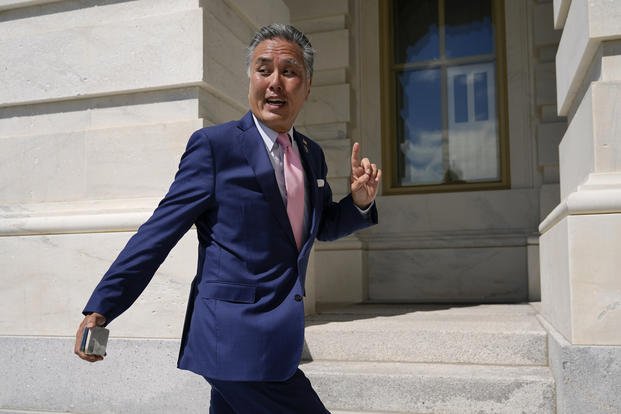With the COVID-19 public health emergency now officially concluded, congressional Democrats are pushing to revive pandemic-related powers that allowed the Department of Veterans Affairs to expand support services for homeless veterans.
At a news conference Friday at the Washington, D.C., chapter of a nonprofit that provides housing and employment assistance to veterans, Democrats on the House Veterans Affairs Committee and advocates for homeless veterans warned that fewer veterans will be able to find help now that emergency authorities have ended and called on Republicans to move forward with a bill to renew the aid.
"The rate that we receive for servicing a homeless veteran went from, last night, $164.67 to $64.52," said Clifton Lewis, executive director of U.S. Vets D.C., where the press conference was held. "How can you provide services to a veteran with just $64.52? Housing, food, case management services -- all the things that we do to service homeless veterans."
Read Next: Army Pilots Are Flying Way Less, as Fatal Incidents Pile Up
Organizations that help homeless veterans nationwide are now "stuck with the decision [of] what resources do I cut," Lewis added.
First declared 1,195 days ago, the COVID-19 public health emergency in the United States formally ended just before midnight Thursday. While the virus continues to circulate -- the VA reported 2,200 active cases at its facilities as of Friday morning -- the Biden administration has said the crisis phase of the pandemic is over and allowed the emergency declaration to expire amid GOP pressure to end it.
For the VA, the public health emergency allowed the agency to provide homeless veterans with free rides from services such as Uber and Lyft so they could get to medical appointments, jobs or support programs. The pandemic authorities also gave the VA flexibility to redirect funding aimed at other programs to food, shelter, clothing, hygiene products, communications devices and other necessities for homeless veterans, as well as the ability to provide larger grants to community groups caring for homeless veterans in transitional housing.
Those extra authorities have been credited as one of the reasons veterans homelessness dropped 11% during the pandemic despite the economic hardships that most of the country faced.
The VA has pleaded with Congress to extend the pandemic authorities, but there has been little progress on doing so.
Bills have been introduced in both the House and the Senate that would extend the VA's pandemic authorities, but the House bill was voted down in committee along party lines last month.
The Senate bill, which is sponsored by Senate Veterans Affairs Committee Chairman Jon Tester, D-Mont., and Sen. Lisa Murkowski, R-Alaska, was just introduced last week, not enough time for the infamously slow upper chamber to act before the emergency expired.
In voting against the House bill, Republicans said they supported the underlying goal of extending the ability for the VA to provide more aid to homeless veterans. But they insisted the measure ran afoul of House rules prohibiting increases in so-called mandatory spending without some form of offset because of accounting complications caused by the sweeping toxic exposure bill passed last year.
"I support providing this type of assistance to homeless veterans," House Veterans Affairs Committee Chairman Mike Bost, R-Ill., said at the April 28 committee meeting. "I will say it again, I support the assistance for homeless veterans. My concern is how this proposal would be funded. Unfortunately, this proposal is impacted by the toxic exposure fund that was created by the passage of the PACT Act."
In a brief interview with Military.com after Friday's press conference, Rep. Mark Takano, D-Calif., the ranking member of the House Veterans Affairs Committee, rejected Republicans' arguments that the math on the bill, which Democrats offered as an amendment to an unrelated measure, would not work. The bill costs an estimated $6 million, and the measure Democrats sought to attach it to had an extra $3 million in offsets to work with, Takano said, adding that he's "sure we could have found the other $3 million someplace."
"Americans care a lot about homeless veterans," Takano said. "They find it abhorrent, the idea that anyone who wore a uniform is on the streets. How can we call ourselves a decent nation if we allow that to happen? I just know that if enough of the American people knew about this situation, that the Republicans would come back to the table and say we have to do something."
-- Rebecca Kheel can be reached at rebecca.kheel@military.com. Follow her on Twitter @reporterkheel.













